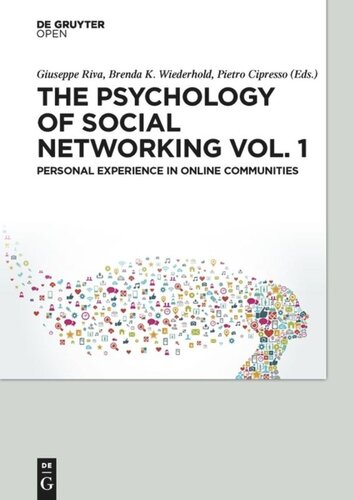

Most ebook files are in PDF format, so you can easily read them using various software such as Foxit Reader or directly on the Google Chrome browser.
Some ebook files are released by publishers in other formats such as .awz, .mobi, .epub, .fb2, etc. You may need to install specific software to read these formats on mobile/PC, such as Calibre.
Please read the tutorial at this link: https://ebookbell.com/faq
We offer FREE conversion to the popular formats you request; however, this may take some time. Therefore, right after payment, please email us, and we will try to provide the service as quickly as possible.
For some exceptional file formats or broken links (if any), please refrain from opening any disputes. Instead, email us first, and we will try to assist within a maximum of 6 hours.
EbookBell Team

5.0
48 reviewsUsing a novel approach to consider the available literature and research, this book focuses on the psychology of social media based on the assumption that the experience of being in a social media has an impact on both our identity and social relationships. In order to ‘be online’, an individual has to create an online presence – they have to share information about themselves online. This online self is presented in different ways, with diverse goals and aims in order to engage in different social media activities and to achieve desired outcomes. Whilst this may not be a real physical presence, that physicality is becoming increasingly replicated through photos, video, and ever-evolving ways of defining and describing the self online. Moreover, individuals are using both PC-based and mobile-based social media as well as increasingly making use of photo and video editing tools to carefully craft and manipulate their online self. This book therefore explores current debates in Cyberpsychology, drawing on the most up-to-date theories and research to explore four main aspects of the social media experience (communication, identity, presence and relationships). In doing so, it considers the interplay of different areas of psychological research with current technological and security insight into how individuals create, manipulate and maintain their online identity and relationships. The social media are therefore at the core of every chapter, with the common thread throughout being the very unique approach to considering diverse and varied online behaviours that may not have been thus far considered from this perspective. It covers a broad range of both positive and negative behaviours that have now become integrated into the daily lives of many westernised country’s Internet users, giving it an appeal to both scholarly and industry readers alike.